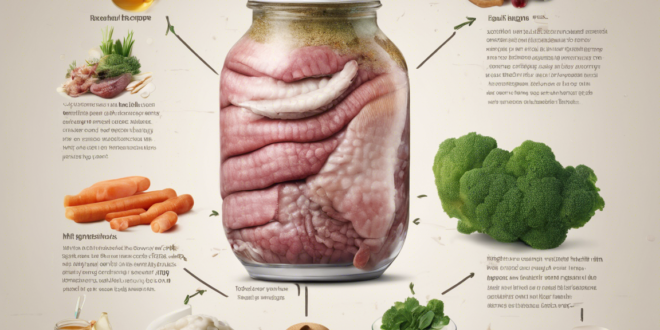Probiotic-Rich Recipes for Gut Health: A Comprehensive Guide to Digestive Wellness
In today’s fast-paced world, maintaining optimal gut health has become more critical than ever. The intricate relationship between our digestive system and overall well-being is a topic of increasing scientific interest and public awareness. This comprehensive guide will explore the transformative power of probiotics, offering insights, recipes, and practical strategies to enhance your gut health and improve your overall quality of life.
Understanding Probiotics: The Basics of Gut Health
Probiotics are living microorganisms that provide numerous health benefits when consumed in adequate amounts. These beneficial bacteria play a crucial role in maintaining a balanced digestive system, supporting immune function, and promoting overall wellness. Unlike harmful bacteria, probiotics work symbiotically with our body, helping to restore and maintain a healthy gut microbiome.
The Science Behind Probiotics
Recent scientific research has unveiled the profound impact of gut health on various aspects of human physiology. The gut microbiome, composed of trillions of microorganisms, influences everything from metabolism and immune response to mental health and emotional well-being. By introducing probiotic-rich foods into your diet, you can positively influence this delicate ecosystem and support your body’s natural healing processes.
Top Probiotic-Rich Foods for Optimal Gut Health
1. Yogurt: The Classic Probiotic Powerhouse
Greek yogurt and traditional yogurt varieties are excellent sources of live cultures. Look for labels that specify “live and active cultures” to ensure maximum probiotic benefits. Opt for plain, unsweetened varieties to avoid added sugars that can counteract the positive effects.
2. Kefir: A Fermented Miracle Drink
This fermented milk drink contains multiple strains of beneficial bacteria and yeasts. With a tangy flavor and creamy texture, kefir provides a more diverse probiotic profile compared to traditional yogurt, making it a superior choice for gut health enthusiasts.
3. Kimchi and Sauerkraut: Fermented Vegetable Wonders
These traditional fermented vegetables are not just condiments but powerful probiotic sources. Packed with beneficial bacteria and essential nutrients, they offer a flavorful way to support digestive health while adding complexity to your meals.
Probiotic-Rich Recipes to Revolutionize Your Diet
Breakfast: Probiotic Overnight Oats
Ingredients:
– 1/2 cup rolled oats
– 1/2 cup kefir
– 1 tablespoon chia seeds
– Fresh berries
– Honey (optional)
Combine ingredients the night before, refrigerate, and enjoy a nutrient-dense breakfast that supports gut health and provides sustained energy.
Lunch: Fermented Vegetable Bowl
Create a vibrant bowl featuring quinoa, roasted vegetables, and a generous serving of kimchi. The combination provides protein, fiber, and robust probiotic support, making it an ideal midday meal for digestive wellness.
Dinner: Probiotic-Enhanced Salmon
Prepare wild-caught salmon with a yogurt-based marinade, serving alongside fermented vegetables. This meal combines omega-3 fatty acids with powerful probiotics, supporting both gut and cardiovascular health.
Lifestyle Factors Affecting Gut Health
Beyond diet, several lifestyle factors significantly impact gut health. Stress management, adequate sleep, regular exercise, and minimizing antibiotic usage can help maintain a balanced microbiome. Consider incorporating meditation, yoga, and consistent sleep patterns to support your digestive system.
Potential Risks and Considerations
While probiotics offer numerous benefits, individuals with compromised immune systems should consult healthcare professionals before making significant dietary changes. Some people might experience initial digestive adjustments when introducing probiotic-rich foods.
Conclusion: Your Path to Digestive Wellness
Embracing a probiotic-rich diet is more than a nutritional choice—it’s a commitment to holistic health. By understanding the intricate world of gut microbiomes and making informed dietary decisions, you can transform your overall well-being, one bite at a time.
Final Tips for Success
– Start slowly when introducing probiotic foods
– Choose high-quality, minimally processed options
– Listen to your body’s unique responses
– Maintain dietary diversity
– Consult healthcare professionals for personalized guidance
 Good Calories Guide GoodCalories Guide focuses on nutrition, healthy eating, and overall wellness. The site offers practical insights into evidence-based dietary practices, including tips for specific lifestyles such as veganism, keto, and family-friendly meal planning. It also addresses unique nutritional needs for individuals with conditions like diabetes or food allergies, while providing quick and accessible recipes to make healthy living a sustainable and enjoyable choice.
Good Calories Guide GoodCalories Guide focuses on nutrition, healthy eating, and overall wellness. The site offers practical insights into evidence-based dietary practices, including tips for specific lifestyles such as veganism, keto, and family-friendly meal planning. It also addresses unique nutritional needs for individuals with conditions like diabetes or food allergies, while providing quick and accessible recipes to make healthy living a sustainable and enjoyable choice.


